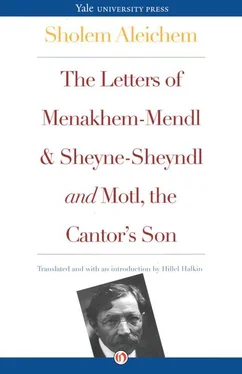Elye didn’t want to give up. He kept looking at the fishink tships with his mouth watering while asking the Jew if he knew of a Committee. The Jew kept one hand on the door knob and talked with the other. There was a Committee all right, he said. He just couldn’t say a good word about it. That is, it wasn’t really a Committee. Or rather, it wasn’t one Committee. It was several. The London Committees didn’t hand out cash so fast. Whoever wanted help had to bring papers and documents proving they were emigrants for America. That was because a lot of Jews in London were just pretending to be emigrants. And once you brought all the documents, you were given a ticket back to Russia. The London Committees weren’t big on America.
That made my brother Elye sore. You already know he has a temper. It doesn’t take much to set Pinye off either. He began to shout:
“But that’s impossible!! How can they send us back to Russia? This is the land of the megneh kahteh.”
Don’t ask me what that is. The man let us out the door and said: “You can talk all you want. Here’s the address of a Committee. You’ll see for yourselves.”
The smell of fishink tships followed us down the stairs. Although we were all thinking about food, no one mentioned it but Brokheh. Did she let loose with a mouthful! She hoped to God, she said, that the people upstairs would choke to death on their stinking fish that you could smell a mile away.
That didn’t go down well with my mother. “What do you have against that poor family?” she asked. “They’re fine folk. Look at the hole they live in — and they still remember to say the prayers for the dead.”
“Mother-in-law!” answered Brokheh. “They should roast in hell with their prayers and their fishink tships! If you kidnap strangers on the street, the least you can do is offer their child a piece of fishink!”
She meant me. One minute I’m a bar-mitzvah boy and the next I’m a child again. Happy times are here if Brokheh is taking my side!
The six of us went off to the Committee. The Jew’s parting advice was to take a tram. The problem with London trams is that they don’t like to stop. You can flag them down till you’re blue in the face, they just fly right past you. It doesn’t help to run after them either, because you’ll never catch them. Luckily an Englishman saw us waving at them and took us to a place where he told us to wait.
Sure enough, we didn’t have to wait long. In a minute a tram pulled up and we climbed aboard, Elye and Pinye and my mother and Brokheh and Taybl and me. Along comes a conductor selling tickets. “Skolke vif l?” asks Pinye. “Aypens,” says the conductor. Pinye gives him aypens. “Not aypens! Aypens!” the conductor says, getting sore. Although Pinye just laughs, Elye loses his temper. “Aypens or not aypens!” he shouts. “Which do you want?” The conductor yanks a cord to stop the tram and chucks us into the street like a madman. You might think we had tried robbing his change belt. How were we supposed to know that eight pence wasn’t ha’-pence?
“Well? Does London deserve to burn or not?”
That’s Brokheh. We went the rest of the way on foot.
The London Committee was the same jolly scene as every other Committee we had been to. The same emigrants filled the same courtyard like rubbish and the same men smoked the same cigars and said, “Next!” The only difference was that the other Committees spoke German and had whiskers and this committee spoke English and was clean-shaven. The women had big teeth, wore hairpieces with curls, and were so ugly they made you want to puke — and there they sat, mocking us with their eyes and pointing at us with their fingers and fidgeting at having to deal with us.
Back in the street two girls stopped Elye and told him to go to a bahbeh shahp. We didn’t know that meant he should get a haircut. What weird people! They go around full of grease stains from the smelly fishink tships they eat in the street and don’t like hair! There are plenty of drunks lying in the gutters here, too. That’s something you never saw back home. England would be a fine country, Brokheh says, if only someone would put a torch to it.
“What good would that do?”
That’s Elye. Did he get it from Brokheh! She’s something when she lets rip. Either she isn’t talking to you or else you have to stop your ears and run for your life. I quote:
“How dare you stick up for this God-accursed, gray-skied, bare-cheeked, twirly-curled, greasy-stained, beer-breathed, beggarly city of old maids and fishink tships and charming Vaytsheplakh and thieving conductors and Jews who pray for the dead and don’t give you the time of day? Fire is too good for it!”
That’s what she said, Brokheh did, all in one breath, praying with her hands clasped together:
“London, I wish you would burn!” God Almighty! When will we get to America?
CONGRATULATIONS! WE’RE IN AMERICA!
Congratulations, we’re in America!
That’s what they tell us, anyway. No one has seen America yet because we’re still on Ella’s Island. Why did they name it for Ella? “Because Ella had no fella,” Pinye says. Pinye can’t resist a rhyme.
Pinye is peeved at Ella’s Island for keeping us poor immigrants here while the rich ones go ashore. That’s something you would expect from a thieving Russky, he says, not from a free country like America. In America rich and poor are supposed to be equal. Pinye starts spouting words: “Columbus …Shakespeare …Buckle …Civilization …” He’s decided to write a poem sending America to the devil but he doesn’t have pencil or paper.
Elye says that if Pinye doesn’t like America, he can turn around and go home. I’ve told you they never agree. “Mr. Summer and Mr. Winter,” Brokheh calls them. Elye doesn’t take that sitting down. “Fat cow” and “Nanny goat” are two of his names for Brokheh. (Some of the others aren’t fit for print.) My mother tells Brokheh that whoever doesn’t want to get scratched should stay out of a fight between tomcats.
What are we doing on Ella’s Island? We’re waiting for our friends and acquaintances to get us out. We’ve been in and out of so many places since leaving London and boarding ship that we know all the questions by heart. “What are your names, please?” “Where are you going?” “Whom do you know in America?”
We give the same answers each time. Once there was a Jew named Peysi the cantor. Peysi died and left a widow: that’s my mother. My mother has a son: that’s Elye. Elye has a wife: that’s Brokheh. He also has a friend: that’s Pinye. Pinye has a wife: that’s Taybl. And there’s me, Motl, and my friend Mendl. Brokheh calls him Teeny because he’s already in his teens.
Whom do we know in America? Why, half the country and just about every Jew! To begin with, there are our neighbors Moyshe the bookbinder, Fat Pesye, and their gang. We list their full names for the immigration officials: “There’s Pinye-Log, and Velvel-Tomcat, and Mendl-Ratface, and Hayyim-Ox, and Faytl-Petelulu, and Berl-Give-Me-More, and Zerakh-Butternose, and Hirshl-Bumpy. Bumpy is called Bumpy because—”
The immigration officials stop us. “All right, we’ve had enough children. Let’s have some adults.”
We give them some adults. “There’s Yoyneh the bagel maker, a mean Jew if ever there was one. That’s one. There’s Yoyneh’s wife, Riveleh-Chemise. That’s two. The chemise was stolen at the border …”
My mother hears “border,” remembers her linens, and begins to cry. Elye scolds her. My mother tells him she’s in America. Now that she needn’t worry about her eyes, she’ll cry all she wants.
Читать дальше












